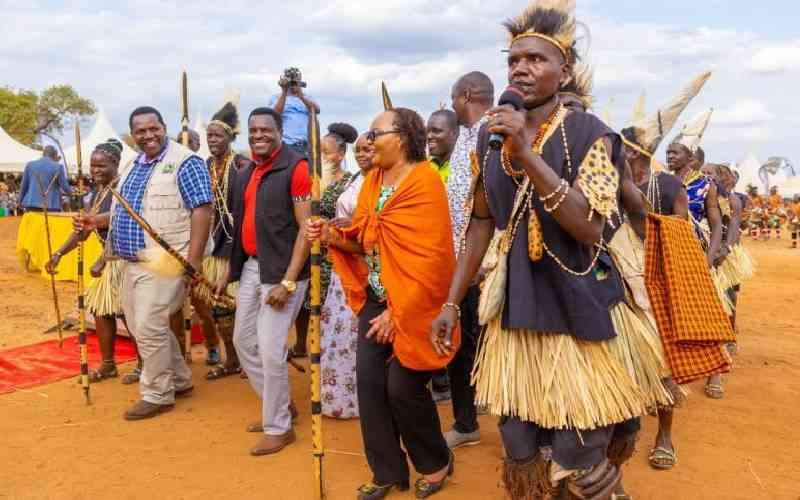Council of Governors Chairperson Anne Waiguru, Tharaka Nithi Governor Muthomi Njuki and his deputy Nyaga Muisraeli at Ura Gate Cultural Festival in Tharaka on September 4, 2024. [Phares Mutembei, Standard]
The Council of Governors has rejected a proposal to slash counties' equitable share from Sh400 billion to Sh380 billion.
The Commission for Revenue Allocation has also supported the CoG saying this reduction will affect service delivery. The CoG argues that the funds they had already been allocated were inadequate given that the Senate had initially allocated Sh415.9 billion that was reduced through a mediation process involving Parliament and Senate the counties had proposed Sh439.5 billion.
CoG Vice chairman Ahmed Abdullahi led a team of 20 governors before the Senate Finance and Budget Committee in Nairobi who said they appreciated the unique challenges the country is currently facing following recent public outrage that led to rejection of the Finance Bill, 2024.
He told the committee chaired by Mandera Senator Ali Roba that in light of this, county governments have put in place measures aimed at fiscal consolidation to align with the aspirations of the people asking the Senate to support counties' efforts to get Sh400 billion allocated to them instead of the proposed Sh380 billion.
“The current situation does not call for any extra-constitutional or extra-legal measures such as the proposed deduction of Counties equitable share, in view of the foregoing, the Council of Governors is opposed totally to the proposal to reduce allocation to counties to Sh 380 billion and calls for retention of the Counties equitable share at Sh400 billion,” said Abdullahi.
The Commission of Revenue Allocation (CRA) supported the CoG in its quest to maintain Sh400.1 billion for the financial year 2024/25 allocation due the growth of Sh379.12 billion in projected ordinary revenue in the financial year 2024/25.
CRA Chairperson Mary Chebukati, who also appeared before the Senate Committee, said the commission was proposing that National Government allocation be retained at Sh2.194 trillion as the counties get their equitable share. “The national revenue is projected to increase to Sh2.602 trillion in 2024/25 compared to Sh2.223 trillion in 2023/24, therefore, the national and county governments will equitably share Sh379.12 billion and there is no justification to reduce the county allocation,” said Chebukati.
She said the national government's intention to borrow additional resource to finance its programme which becomes a first charge on the equitable share in subsequent years and the provisions of Article 203 (1)(j) which provides for stability and predictability in the county equitable share allocation.
Chebukati said the proposed reduction in the county allocation in the Division of Revenue (Amendment) Bill 2024 would negatively affect the capacity of the county governments to provide services to the citizens given the timelines in the budget calendar.ble share of revenue is based on the last audited accounts as approved by the National Assembly and not on projected revenue with the projections under the impugned Finance Bill,2024 should therefore not be the basis of revenue sharing.
Mutula said the Constitution provides that counties equitable share shall be allocated in a stable and predictable manner, and on this basis counties allocation is protected from revenue shortfalls, which shall be borne by the national government and any excess revenue shall also accrue to the national government.
“Given this is a financial legislation affecting counties, we note the Commission on Revenue Allocation did not give its recommendations and neither has Parliament voted on the same as required by the Constitution," he said.
"Counties equitable share has been excluded from the National Governments Appropriation and by extension the budget estimates under Article 221 (7) as it is a charge on the Consolidated Fund,” he added.
The Makueni governor told the Senate that each county prepares its own Finance Bills, and their policies are not expected to prejudice national economic policies (Article 209 (5) which he says puts up a strong case for the counties to get their equitable share without it appearing that they are being done a favour by the national government.
Kakamega Governor Fernandez Barasa, COG Finance Committee chairperson, argued that reducing the counties allocation from Sh400.117 billion allocated under the Division of Revenue Allocation, 2024 to Sh380 billion as proposed will paralyse operations in counties and provision of critical services such as health.
“The proposed allocation is lower than the Sh385.4 billion allocated in the last Financial Year which means counties will not maintain their operations even at the minimum, the budgeting system in Kenya currently is incremental therefore at no point should Counties allocation be lower than the previous year's,” said Baraza.
He said the national government has pronounced intention to borrow additional resources to finance its programmes affected by the projected deficit and therefore no need for further cuts.
Public debt forms the first charge on equitable share in subsequent years and will directly affect the Counties share with deduction only meant to punish counties in present and future allocations.
He said despite the withdrawal of the Finance Bill 2024, the ordinary revenue is projected to increase to Sh2.602 trillion in 2024/25 from Sh2.223 trillion realised in 2023/24, of the additional Sh379.12 billion the counties are set to receive an additional Sh14.72 billion, therefore, there is no justification to reduce the county allocation.
Barasa said the National Assembly has proposed further deductions on county governments additional allocations on similar grounds which if approved will cause further strain to counties resources and operations with the non-discretionary expenditures for the current Financial year such as housing levy deductions, payment of CHPs and CAIPs funding have not been waived hence the counties will be obligated to provide funds for the same. By Edwin Nyarangi, The Standard






